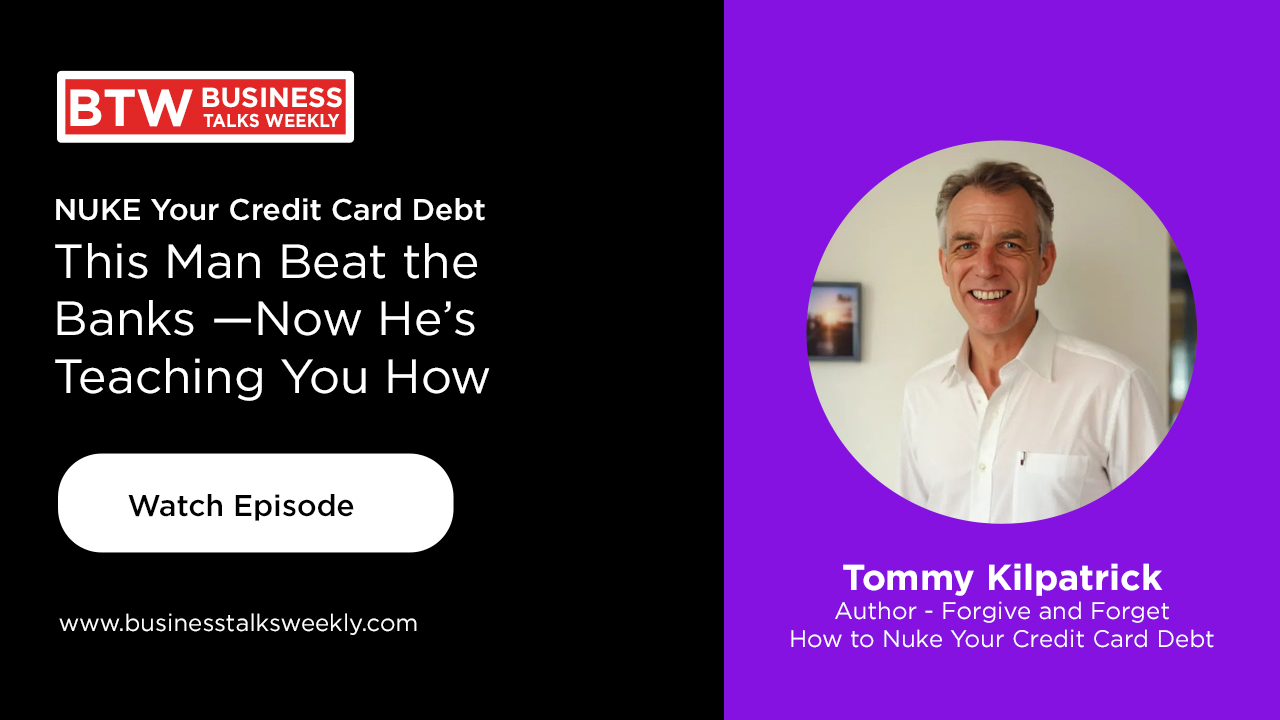What if your credit card debt wasn’t really a debt at all?
Author and financial activist Tommy Kilpatrick joins the Power Talk Show to challenge everything we think we know about consumer debt, especially credit cards. In a journey that spans careers in diving, beauty products, infomercials, and finally homelessness by choice—Tommy’s path led him to a radical but well-researched realization: bank-issued credit card debt may be fundamentally flawed.
With his book “Forgive and Forget: How to Nuke Your Credit Card Debt”, Tommy wants to ignite a global movement—educating consumers about fraudulent banking practices, exposing legal loopholes, and showing how average people can take control of their finances without fear or shame.
The Infomercial Collapse That Sparked a Financial Awakening
In the early 2000s, Tommy was thriving in the health and beauty industry when a failed infomercial deal and a mounting $85,000 credit card debt pushed him into a financial crisis. But instead of succumbing to the pressure, he questioned the very nature of the debt.
He asked himself:
“If the bank never gave me physical money or made me sign a promissory note… is it really a loan?”
The Book: “Forgive and Forget”
Tommy’s book dives deep into this argument:
- Banks do not create real loans; they create money through ledger entries.
- Most credit cards are tied to free checking accounts, not actual credit.
- No promissory note = no legal loan, especially in the eyes of accounting law.
- Supreme Court precedents suggest that fraud invalidates all contracts.
And the solution?
Tommy proposes a simple but powerful strategy:
Write a letter to the issuing bank demanding the closure of your associated free checking account.
“I filed federal lawsuits. I lost in court. But months later, my credit card debt vanished from my credit report—and I never received a 1099-C. That told me everything I needed to know.”
Credit Cards: Enemy or Tool?
Despite his anti-debt crusade, Tommy still uses a credit card—but with precision.
He explains:
- Only use less than 10% of your limit.
- Always pay it off in full, never carrying a balance.
- Never confuse marketing tricks (like cashbacks and instant EMIs) with financial benefits.
“The bank is not lending you money. It’s marketing. You’re spending your own deposits without realizing it.”
The Bigger Picture: Legal and Ethical Loopholes
Tommy encourages readers and listeners to:
- Challenge their assumptions about debt.
- Consult with a CPA or attorney who understands accounting law.
- Use legal tools like injunctions, discovery, and complaints to protect themselves.
His proposed framework:
- CPA letter = disprove existence of debt
- Attorney letter = invoke legal invalidity due to fraud
- Unfiled lawsuit = pressure without litigation
- Close the account after withdrawing your funds
Is This the Beginning of a Financial Rebellion?
Tommy envisions a world where:
- Consumers are empowered, not trapped.
- Banks are held accountable for deceptive practices.
- Financial literacy becomes a grassroots movement.
“Just ask yourself: have you been lied to, indoctrinated, and brainwashed into believing this debt is real?”
Whether or not you accept Tommy’s radical message, his story is a powerful reminder: question everything—even your bank statements.


